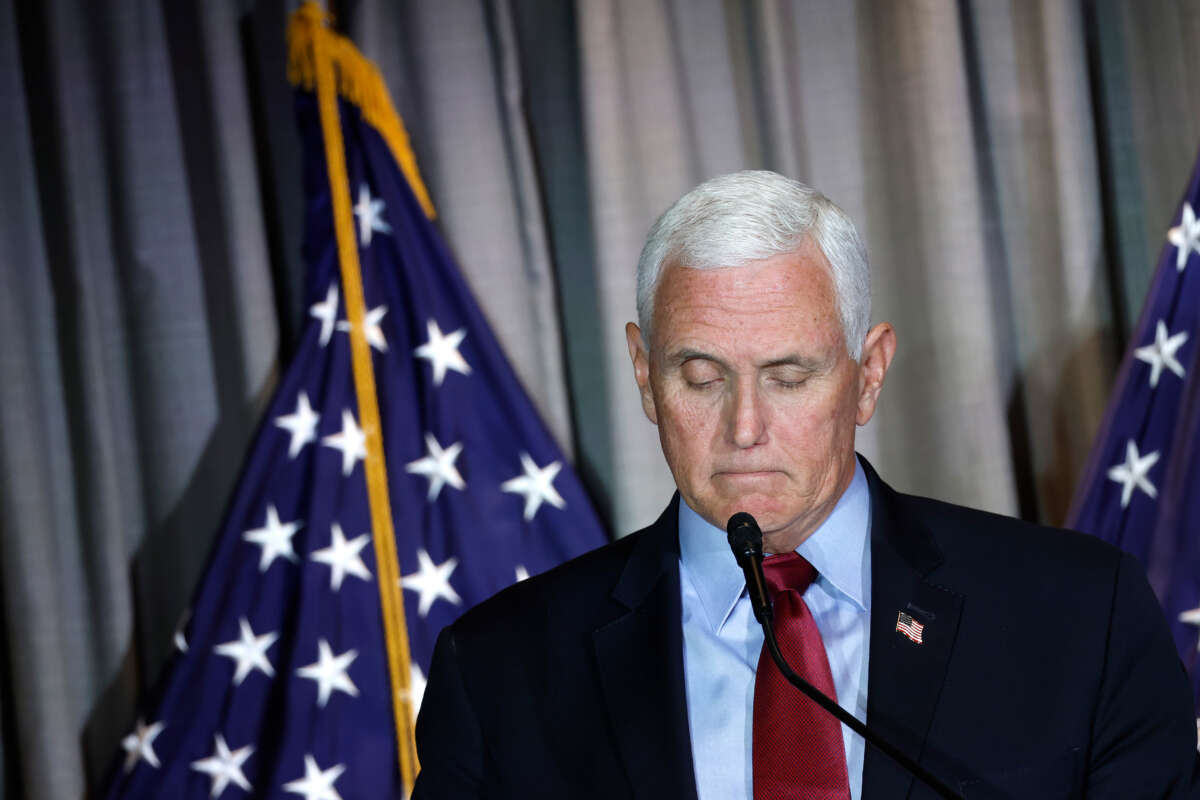Former Vice President Mike Pence will not commit to supporting his ex-boss, former President Donald Trump, to run again for president, if Trump wins the Republican nomination in 2024.
Trump announced in November that he would be running for president, the third time he’s done so in as many election cycles. Pence, who ran with Trump in 2016 and 2020 as his choice for vice president, has not yet declared himself a candidate for president but is expected to do so.
In a CBS News interview that aired on Wednesday, Pence said he was hopeful that Republican voters would choose a candidate other than Trump during the primaries.
“I’m very confident we’ll have better choices come 2024,” he said.
Pence said he believes voters in his party will choose their nominee “wisely again,” but added that “different times call for different leadership” when asked if Trump would be a good choice.
The former vice president, who previously served as a congressman and as governor of Indiana, suggested that voters should focus on conservative ideals rather than “big personalities.” Earlier this week, he advised a group of young Republican voters in Michigan to “resist the temptation of focusing on personalities or embracing a populism unmoored to conservative principle.”
Pence is currently deciding whether to run for president himself, stating in several interviews that he is “praying” on the matter. His activities in recent months, however, suggest that he’s likely planning to throw his hat into the ring.
In a visit to Iowa last month, Pence attacked LGBTQ people and derided policies that support transgender children as “radical gender ideology” — a cynical and increasingly common strategy for Republicans who are seeking to activate their base.
Many in the GOP view Pence as a possible alternative to Trump, who they believe is unelectable and responsible for the party underperforming in the 2022 midterms.
Paul Ryan, for example, who served as Speaker of the House of Representatives during the first two years of Trump’s presidency, said that he wouldn’t attend the Republican National Convention in Milwaukee next year if Trump wins the GOP primaries.
In an interview with Milwaukee ABC affiliate WISN, the former Wisconsin lawmaker was asked if he’d be attending the convention. “It depends on who the nominee is. I’ll be here if it’s someone not named Trump,” Ryan said.
He went on:
The reason I don’t think he’ll be our nominee is because we know we’re going to lose with him. He cost us the House in ’18, he lost the White House in ’20, he cost us the Senate in ’20, he cost us the Senate again in 2022, and he cost us probably a good dozen House seats in 2022. This is a lesson we don’t need to repeat again.
While Ryan’s and Pence’s comments suggest that some Republican lawmakers are seeking to distance themselves from Trump, polling indicates that this may be difficult. A majority of Republican-leaning respondents in an Emerson College poll that was published this week say they want the former president to be the nominee, with 55 percent backing Trump and only 25 percent saying they’d prefer Florida Gov. Ron DeSantis. Pence garnered only 8 percent of Republican voters’ support, according to the poll.
But concerns over Trump hurting Republicans in general election contests do have merit: An Economist/YouGov poll published on Wednesday found that fewer than 3 in 10 voters (29 percent) want Trump to run for president in 2024, while 57 percent said that he shouldn’t run again.
Join us in defending the truth before it’s too late
The future of independent journalism is uncertain, and the consequences of losing it are too grave to ignore. To ensure Truthout remains safe, strong, and free, we need to raise $46,000 in the next 7 days. Every dollar raised goes directly toward the costs of producing news you can trust.
Please give what you can — because by supporting us with a tax-deductible donation, you’re not just preserving a source of news, you’re helping to safeguard what’s left of our democracy.
